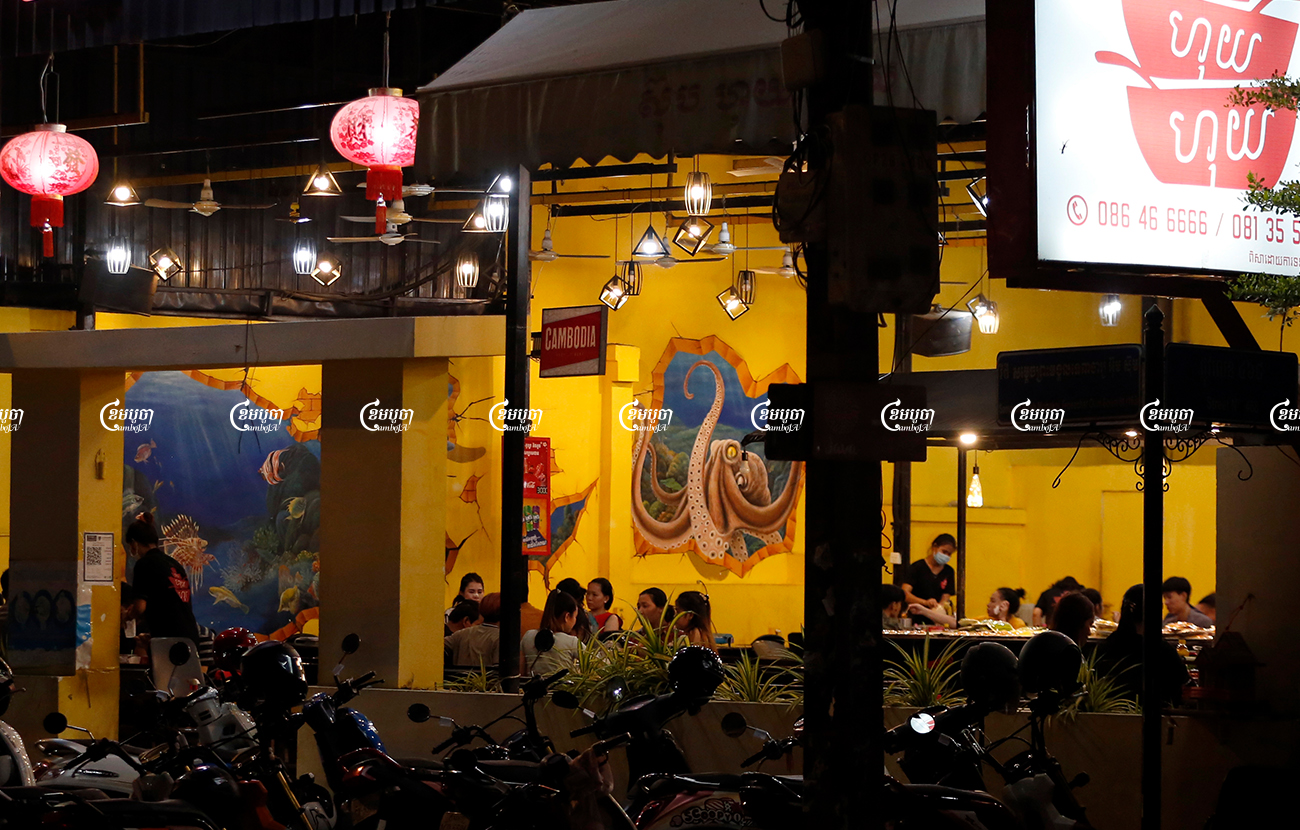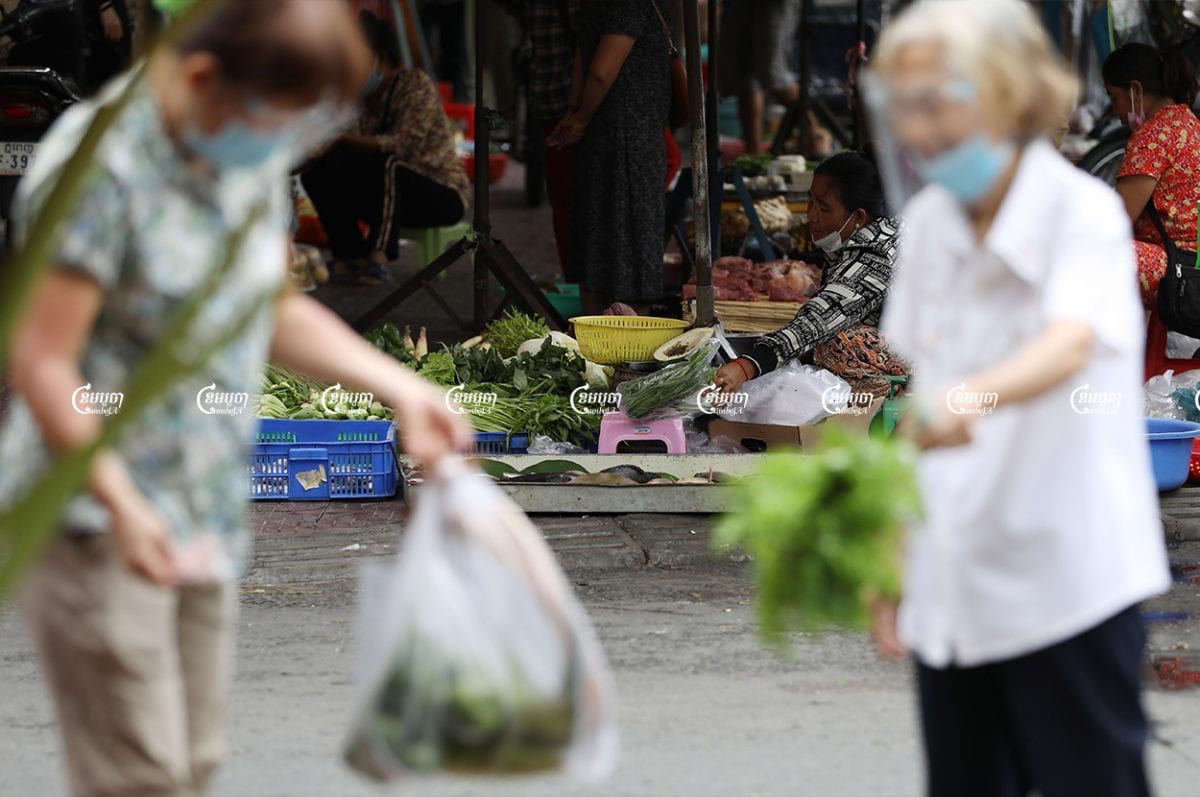Public markets and restaurants have reopened their doors to customers following a decision by the Phnom Penh municipal administration on Friday evening. But with the daily number of new COVID-19 cases still in the hundreds, some observers are worried that the end of lockdown may have come too soon.
Phnom Penh deputy governor Keut Chhe told CamboJA that Cambodians would have to learn to live with the virus in a new way, comparing COVID-19 to diseases such as HIV/AIDS and the flu, which no country has yet been able to eliminate.
“We reopened businesses in some areas after thinking about the rate of [COVID-19] infection already,” he said. “COVID-19 still continues to spread in workers’ rental houses, but not in the middle of Phnom Penh.”
Chhe warned that businesses that failed to respect Ministry of Health guidelines on hygiene and COVID-19 prevention would be punished under the law.
“If they do not follow [these instructions], we will take administrative measures [such as] withdrawing their business licenses and closing their shops,” he said. He added that authorities would continue to monitor dark yellow zones where most of the infections were contained, particularly in parts of Phnom Penh with high levels of factory workers living in rented accommodation.
Speaking on Monday, Hort Vanthy, O’Russei Market’s chief, said that market officials had been working with health ministry workers to sterilise the space reserved for the market’s 983 food stalls — though not all vendors had returned to their posts.
“Only 40 stalls of meat, fish, and vegetables reopened this morning,” Mr Vanthy said. “We scanned their temperatures and cleaned their hands with alcohol or sanitizer gel before we allowed them to enter the market,” he said. He added that all market vendors were required to be tested for COVID-19 before returning to work. The market normally holds more than 6,000 stalls.
Som Phally, 35, a pork vendor at Century Plaza Market along Russian Boulevard in Phnom Penh’s Pur Senchey district, said that market administration officials had told her she would not be able to reopen her business until the market had been sterilised.
“They told me that in two days, they will allow [food] vendors to sell,” she said.
Despite the widespread reopening, many restaurant regulars remain cautious. Von Monirath, the owner of Soup Hoy Hoy, which has five branches in Phnom Penh, said his restaurants reopened on May 22, the day after city hall announced the change in policy.
“There are some guests who go to eat, but it still has just a few guests so far — maybe citizens are still scared of COVID-19 infection,” Monirath said. “If we compare it to before the COVID-19 outbreak, there are about 20 percent of the guests who went to eat in my restaurant.”
He added that his restaurant respects the Health Ministry’s instructions such as mask wearing, hand-washing and maintaining social distancing. In particular, all 50 of his staff had already been vaccinated against the virus.

Moeun Tola, executive director of labor rights group CENTRAL, said that he believed that the reopening signaled a compromise from authorities after they had struggled to distribute food to people in red zones during the lockdown. And because income support was limited to factory workers rather than the general public, he added, the government had rushed to reopen public markets and restaurants amid growing economic hardship.
“I am still reluctant to open restaurants that allow guests to dine in. For me, I still say that it should not be allowed,” he said. “It would be better if we allowed them to sell packaged food for takeaway for guests who need to eat.”
Ny Sokha, head of the monitoring section at rights group Adhoc, said that while he was still concerned about the number of COVID-19 cases, the government could not keep people locked down without impacting their livelihoods.
“Even if they allow public markets to reopen and restaurants to allow guests to dine in, the government has to require them to continue to maintain hygiene or keep social distancing … and the government has to continue to educate the citizens more,” he said.
Sokha said that it was essential that the government was prepared to distribute food not only to citizens during the lockdown, but also to those still suffering from food shortages amid the COVID-19 pandemic. He warned that even though public markets were reopening, vendors at smaller markets including community and factory markets still lacked a place to sell.
“Citizens who run informal businesses do not earn a living selling at big markets,” he said. “Most of them can only earn a living at small markets, so the government should arrange places for them to sell their goods to help them during the pandemic.”
The Ministry of Health reported 556 new cases of COVID-19 on Monday, bringing the total case count to 25,761 since the pandemic began in 2020. The ministry has recorded 18,359 recovered cases and 179 deaths.








